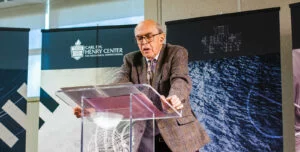Over a series of seminal works, Kathryn Tanner has established herself as one of America’s leading theologians working at the intersection of theology and culture. Active in the Episcopal Church, Tanner has been a member of the Theology Committee that advises the Episcopal Church’s House of Bishops.
She is a past president of the American Theological Society, editor of key works from Oxford University Press, serves on the editorial boards of major theological journals, and was honored in 2015 with an edited volume devoted to her contribution to theology. The Gift of Theology: The Contribution of Kathryn Tanner, ed. Rosemary P. Carbine and Hilda P. Koster (Minneapolis: Fortress, 2015).
Her work on a doctrine of creation has been presented over several monographs and essays and offers both a constructive account of the doctrine and several methodological corrections for those wanting to contribute to this area of study.
The Theologian as Grammarian
Tanner has published significant works on the Trinity, Christology, and culture, working with social, cultural, and feminist theories, and it is this paradigm with which she approaches a doctrine of creation. Unlike other theologies of creation, however, Tanner approaches the topic linguistically, providingTanner’s primary contribution to a doctrine of creation is not what theologians are saying about it, but the way they say it. ruled ways of speaking of God’s transcendence and immanence, and the ways in which God can, in a non-contrastive way, be at once sovereign over creation and intimately involved with it. The most significant work related to the current theme is her 1988 monograph, God and Creation in Christian Theology: Tyranny or Empowerment?Kathryn Tanner, God and Creation in Christian Theology: Tyranny or Empowerment? (Oxford: Blackwell, 1988).
In God and Creation, Tanner takes as her thesis the deeply embedded Christian commitment to both divine and human agency. In the face of recent charges of incoherence, Tanner convincingly shows there are ruled relations among traditional forms of theological statements which make sense of God’s transcendence and immanence and which do not threaten the free agency of creatures.The examples of Irenaeus, Tertullian, Thomas Aquinas, and Karl Barth are provided. Tanner has commented more fully on Thomas and Barth elsewhere. See “Creation,” in Cambridge Companion to the Summa Theologiae of Thomas Aquinas, ed. Philip M. Cosker and Denys Turner (Cambridge: Cambridge University Press, 2016), 142-155; and “Creation and Providence,” in The Cambridge Companion to Karl Barth, ed. John Webster (Cambridge: Cambridge University Press, 2000), 111-126. In response to recent attempts to discredit Christian theology by scientific advancements, Tanner shows the coherence of Christian discourse according to certain ruled uses of language. As such, Tanner’s primary contribution to a doctrine of creation is not what theologians are saying about it, but the way they say it. Only when such ruled readings of theology are entertained can theologians coherently speak of a doctrine of creation.
Central to Tanner’s position is the claim that Christianity has always considered God’s involvement with the world in a non-contrastive way. She writes:
Our distinction between contrastive and non-contrastive accounts of divine transcendence allows us to diagnose the problem: God’s transcendence and involvement with the world vary inversely in this way only when God’s transcendence is defined contrastively.Tanner, God and Creation, 45.
In contrastive accounts of divine and human agency, God is inevitably brought down to the level of the world and the beings within it in virtue of that very opposition: “A God who genuinely transcends the world must not be characterized, therefore, by a direct contrast to it.”Ibid., 46. According to an orthodox non-contrastive account of God’s transcendence, God must be radically productive of everything that is in every aspect of its existence. Anything short of this is a diminished divine transcendence—but this does not come at the cost of free human agency. Tanner derives two rules that follow from this commitment:
First, a rule for speaking of God as transcendent vis-à-vis the world: avoid both a simple univocal attribution of predicates to God and the world and a simple contrast of divine and non-divine predicates. In the case of univocity, God is not really transcendent at all. In the case of a simple contrast, God’s transcendence is not radical enough . . . The second rule is as follows: avoid in talk about God’s creative agency all suggestions of limitation in scope or manner.Ibid., 47.
With these two rules in place Tanner next examines the coherence and consistency of the claim that human creatures have their own powers and efficacy and once again she develops a convincing non-contrastive account:
To exclude genuine created efficacy as a possible direct effect of God’s agency is to misunderstand, then, the nature of the transcendence implied by the supremacy, sovereignty and holiness of God. In the Christian tradition, God’s greatness does not require any denial of the creature whose being is constituted in dependence upon him.Ibid., 87.
In short, the creature’s efficacy is grounded in the creative agency of God.A doctrine of divine concursus is permitted, argues Tanner, if this does not imply a concord between God and the creature, as there is no simple convergence of independent lines of divine and created agencies productive of a single created effect. God’s transcendence prohibits such talk of divine and human parity. Rather, divine agency is necessary for any action of the creature. See Tanner, God and Creation, 94. As Tanner concludes:
Created agents can only affect the operation of other creatures to bring them in line with their own wishes; God alone can be said to effect the actions of others by a creative operation that bring creatures to be in accord with God’s intentions for them.Ibid., 95.
Modernity and its aftermath, postmodernity, has bequeathed to the church a Pelagian tendency that asserts the independent power and efficacy of the creature. This, Tanner avows, is out of keeping with the Christian tradition. In any talk of divine and human agency, Tanner advises:
The order of exposition, if you will, must follow the order of reality. The creature is nothing without God. There is therefore nothing to say about the creature without talk of God first. So long as this sort of priority is constantly maintained, the theologian can go on to affirm modern claims for the productive powers of human agents, their rights of self-determination, and the sufficiency of explanations of natural events in terms of natural causes.Ibid., 162.
This is the challenge Tanner gives to theologians working today, to take such arguments and apply them to contemporary questions so that “traditional affirmations about God and the world come to hang together intelligibly once again.”Ibid., 169.
Is God in Charge?
It will be instructive to consider two aspects of application to which Tanner turns her attention: what kind of God is God, and how to respond to the current environmental crisis. In all discussions about creation, Tanner cautions Christians to develop distinctively theological doctrines and arguments. By this she means we must construct doctrines that are based on the triune God, are conditioned by the incarnation of the Son, and are set within the whole story of God’s dealings with the world.In this regard, Tanner’s work shows the same level of confidence in the work of the theologian as did John Webster’s when he called for a “theological theology.” See John B. Webster, “Theological Theology,” in Confessing God: Essays in Christian Dogmatics II (London: T&T Clark, 2005), 11–32. Without this carefully coordinated approach, Christian beliefs about creation revert to the novel, the arbitrary, or the fantastic.Kathryn Tanner, “Is God in Charge? Creation and Providence,” in Essentials of Christian Theology, ed. William C. Placher (Louisville: Westminster John Knox, 2003), 119. See also, Tanner, “Creation and Providence,” in The Cambridge Companion to Karl Barth. When theology simply capitulates to science, Tanner believes it can often take on an arbitrary stance, or even, a fantastical one. The start of such a theological doctrine of creation is the affirmation that God is not a thing but is beyond kinds, and as such, he has no limitations and is responsible for every aspect of the world and is so in an immediate way. This is what makes Christology so important: it is “the paradigm in a remarkably extreme form of what the Christian doctrine of creation is saying about the immediacy of God’s relation to the world . . .”Tanner, “Is God in Charge?,” 122. In Christ the fullness of deity dwells, and that fullness or presence is to save the whole world, not simply its human inhabitants. As Tanner succinctly states: “God’s comprehensive concerns as savior are matched, in short, by God’s comprehensive concerns as creator.”Ibid.
Controversially, Tanner argues that when it comes to considering the act of creation “one should not even think of the creation of the world as a movement or change from a time when nothing existed to a time when everything does . . .” Rather, “One should think of the world being created by God as it exists, and not in the movement from nothing to something.”Ibid., 123. Accordingly, the term ‘creation’ applies not simply to the start of something but to its entire existence, and so a doctrine of creation of the world is not to concern itself with the beginning only, but across the whole time of its existence. When thinking properly of God’s creating the world, one is to dismiss all ideas of time, change, and finite processes; when that is done, all that is left is “the bare idea of a relation of utter dependence on God that holds for the whole world, in every respect, across the whole time of its existence.”Ibid., 124. One corollary of this commitment is to see a doctrine of providence as simply a more specific part of a doctrine of creation, a move Tanner makes. As such, God does not enter the world as one force amongst others, either regularly or occasionally. Neither is God working alongside us, doing one part of a work and us another. Instead, “God, as creator, is responsible for the working of the whole.”Ibid., 129. Once again, she argues that Christ is the key to all of this, both ontologically and epistemically, as “only in Christ is any of this known for sure.”Ibid., 130.
When Tanner addresses the issue of the current environmental crisis facing humanity she examines three strands of the Christian tradition on a doctrine of creation before suggesting her own corrective. Rejecting the imitation of God’s rule (a dominion model), the Great Chain of Being (a teleological model), and the stewardship model, Tanner believes Christians need to see the best features of each model while adopting a new orientation to the relations between God, humans, and creation. The central problem is the ingrained and assumed anthropocentrism of these three models which inevitably, she argues, ends up with humans privileging humans over the rest of creation. Tanner’s solution is to put what humans share with the rest of creation on a par and into first place, and then explore the difficult questions the environmental crisis poses. Her conclusion is that while “nonhuman beings remain a focus for moral concern, an ideal of equal enjoyment of entitlements remains the ultimate goal for human action.”Kathryn Tanner, “Creation, Environmental Crisis, and Ecological Justice,” in Reconstructing Christian Theology, ed. Rebecca S. Chopp and Mark L. Taylor (Minneapolis: Fortress, 1994), 119. Only when creation is viewed by humanity as a single community of moral concern will the current environmental crisis be able to be addressed responsibly and justly.
In Dialogue with Tanner’s Theology
Throughout Tanner’s work the focus remains on how to speak rightly of a transcendent yet immanent God, of free divine and human agency, and how Christian talk of God, humanity, and creation is to be properly coordinated to respect God’s ways over and in the world, and the place of all creation in God’s plan of redemption. There is much to commend in Tanner’s work, and the frequency by which it is cited in works on theologies of creation is testament to that. The theological focus of her work is a crucial insight and important reminder for those working at the intersections of theology and science. When so many theologian-scientists are beguiled by the false offerings of panentheism, Tanner’s work issues a clarion call to respect the Creator-creature distinction and the equally strong appeal to clearly articulate and hold to the radical Christocentric vision of the New Testament.See especially Kathryn Tanner, “Creation Ex Nihilo as Mixed Metaphor,” Modern Theology 29 no. 2 (2013), 138–155. While her work is provocative, profound, and compelling, it does raise some important theological questions and concerns.
One such concern I have is that, puzzlingly, Tanner doesn’t seem to let the incarnation dictate and guide her theology of creation, despite making “Christ the key” (the title of one of her books) in much of her theology.Kathryn Tanner, Christ the Key (Cambridge: Cambridge University Press, 2010). For Tanner, theology is pragmatic and its force comes from the rhetorical nature of theological statements. That is not to say that she is committed to some form of theological anti-realism, but that language is rhetorical (think here of Lindbeck’s cultural-linguistic theological method). As such, it seems enough for Tanner to interrogate the rules of language in order to make coherent and convincing theological statements, without repeatedly turning to the incarnation, the event in which God personally enters into the world. As Colin Gunton once asserted: “If you want to understand how God works in our world, then you must go through the route God himself has given us—the incarnation of the eternal Son and the life-giving action of theIn conjunction with other major voices in this area, her grammatical theology is incredibly important as a form of prolegomenon to a doctrine of creation, and for that we should all be grateful. Spirit.”Colin Gunton, “The Forgotten Trinity,” in Father, Son, and Holy Spirit: Toward a Fully Trinitarian Theology (New York: T&T Clark, 2003), 11. Nowhere do we find an extended discussion on the contingent and open-ended nature of creation and the way in which this points to a transcendent ground of intelligibility. When correlated with a doctrine of creation ex nihilo (which Tanner is committed to), this would have enabled her to locate the paradigm for this intelligibility in the incarnation. A more Christologically focused account of creation would enrich Tanner’s doctrine and allow it to be deeply theological as opposed to pragmatically rhetorical.
A criticism of a different sort can also be registered. Tanner’s work on a doctrine of creation has yet to deal with what many might consider issues central to the subject. While she has brilliantly set the scene, as it were, with her linguistic and grammatical rules for reading, she has yet to delve into the issues of the creation narratives, the science and theology discussions, the issue of evolution and how this is read in conjunction with the creation accounts in Scripture, and how we are to interpret and understand what theologians call ‘the fall’ (perhaps the most contested aspect of a doctrine of creation in contemporary theology). That she has opinions on such matters is clear, but to date one only finds hints of what her position on such topics might be. This lacunae in her works may be intentional, of course, given her commitment to the concept that creation, if it is from nothing (ex nihilo), means that there is no process, there is nothing prior to creation, and thus to speak of God as creating is to describe God’s relation to the world, and not a scientific process of beginnings.Tanner, “Is God in Charge?” 123. Ian McFarland, for his part, follows Tanner’s argument at this point. See Ian McFarland, From Nothing: A Theology of Creation (Louisville: Westminster John Knox, 2014), 58–59. This, of course, will like not satisfy many who are interested precisely in the process and order of beginnings.
Tanner’s theology of creation is both profound and useful, despite the limitations of her corpus. In conjunction with other major voices in this area, her grammatical theology is incredibly important as a form of prolegomenon to a doctrine of creation, and for that we should all be grateful.








Comments
Be the first one to make a comment!